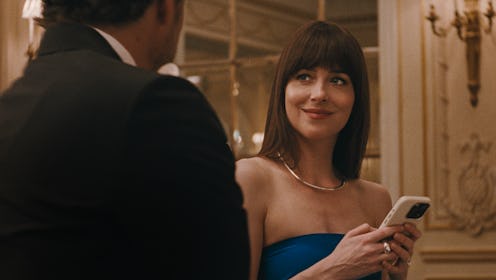Bustle Exclusive
Celine Song Explains Dakota Johnson’s Choice At The End Of Materialists
The buzzy romance has finally arrived — and there’s a lot to talk about.

If you can’t stop thinking about Materialists, you’re not alone. The new romance — the sophomore film by Past Lives writer-director, Celine Song — finally arrived on June 13, using a star-studded love triangle (played by Dakota Johnson, Chris Evans, and Pedro Pascal) to explore questions about money, relationships, and life’s big decisions.
The film follows a matchmaker named Lucy (Johnson) as she considers two of her own swoon-worthy suitors. There’s John (Evans), the ex she once parted ways with because of his insecurities around money, and Harry (Pascal), the handsome millionaire who has no such concerns and can indeed provide her the life she’s dreamed of.
So... who does Lucy pick? And why? During a recent chat as part of Bustle’s One Nightstand, the acclaimed filmmaker broke down some of the buzziest questions you may still be thinking about. Spoilers ahead!
Why Lucy Really Chooses John
Over the course of Materialists, Lucy realizes that despite loving what life with Harry looks like — the dreamy dates and lavish abode — she doesn’t love him. She opts out of their planned trip to Iceland and reunites with John, who later declares his love and proposes with a daisy ring.
It’s a nod, Song tells Bustle, to those ancient love stories that might be lost to time — ephemeral like a flower — but are no less real to those who live them.
“It may not be made of big rock like the one that Harry’s trying to propose with — the beautiful diamond ring — and it may not have the material, tangible thing,” she says. “But the ring that John passes her ... it doesn’t mean that the feeling in it is less. It is still something that is being passed between them.”
Does Lucy Stay At Her Job?
While Lucy is a successful matchmaker, she’s discouraged when a client gets into a dangerous situation with her match. She plans to resign, but is offered a promotion to stick around. It’s not clear in the film whether she accepts.
“That’s one of the first conversations Dakota and I had,” Song says. “And we think she keeps the job. She has to, right? How’s she going to pay rent at her place, with her broke fiancé?”
Beyond that practical note, Song explains why it’s important that Lucy keep her job. Namely, it gives her options that the romance heroines of yore didn’t have. “Your income, and then your material reality, is much more in your control — because we as women can work,” she says. “We work a lot. And I feel like we have power in the material world. There’s so much that shifted since Pride and Prejudice.”
A Key Detail About Lucy’s Family
Speaking of Pride and Prejudice, there’s a reason why you won’t find any Mrs. Bennet-esque family members steering Lucy’s choices over the course of Materialists.
“We have already installed the value police inside of us,” Song says.
In the past, she explains, “it was the minders and the parents and the aunts and uncles who were like, ‘You must marry this person.’ But the truth is, I feel like the self-commodification and self-objectification have become so internalized that now we’re fully speaking the language of the oppressor.”